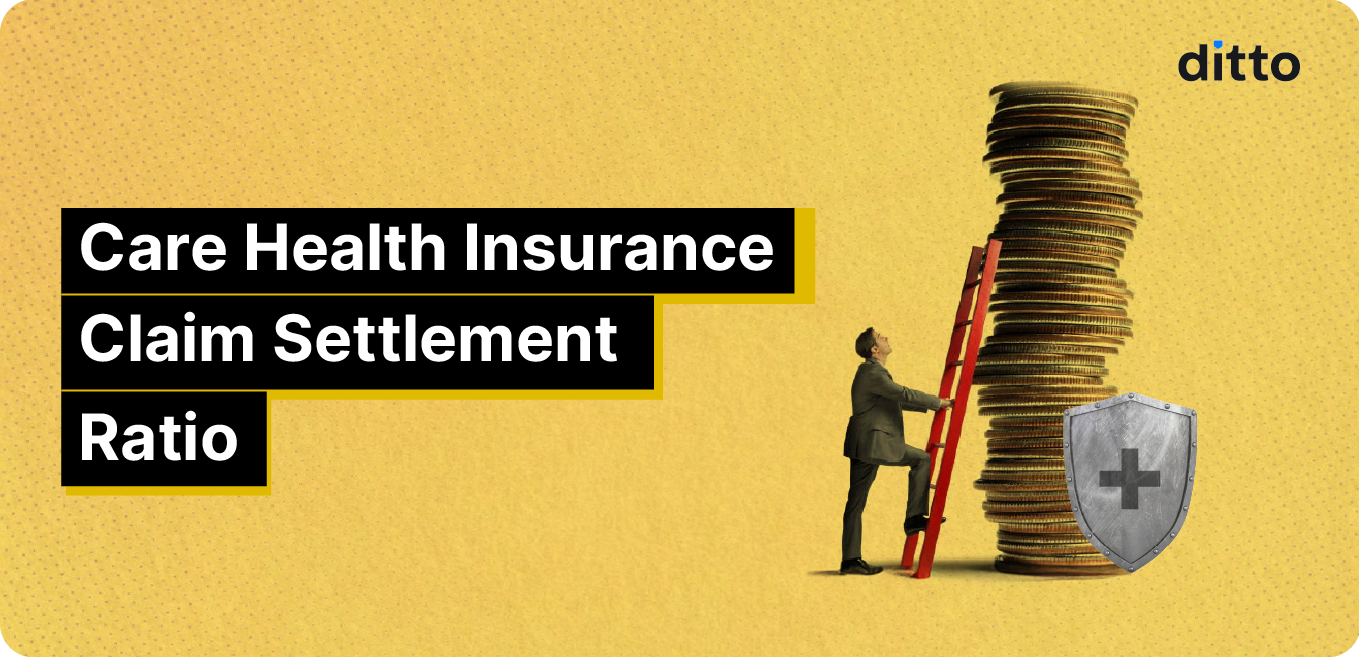What is Care Health Insurance Claim Settlement Ratio?
Care Health Insurance Claim Settlement Ratio: Overview
An insurer’s reputation is built on numbers, and Care Health is no exception. As the second-largest standalone health insurer, Care Health offers a diverse portfolio of health insurance policies.
Given the significant market share, many people associate Care Health Insurance with a good claim settlement ratio and wonder whether it is in the top 10 health insurance companies by CSR. But is this truly the case? Let’s find out.
In this article, you will learn:
- What is claim settlement ratio?
- How to calculate the claim settlement ratio of Care Health insurance?
- Care Health insurance’s past 3 years' claim settlement ratio
- Top health insurers in 2026 and their CSR
Friendly reminder: Comparing policies can get overwhelming. Save time and get free, personalized advice from Ditto—no spam, just 30 minutes to clear all your doubts. Book a call now!
What is Claim Settlement Ratio and How to Calculate it?
Claim Settlement Ratio (CSR) is the percentage of claims paid by an insurance company out of the total claims received in a financial year. A CSR above 90% usually indicates smoother processing and better reliability.
At Ditto, we use a clear and consistent method:
CSR = (Claims settled ÷ Total claims that required a decision) × 100
“Total claims that required a decision” includes all unsettled claims carried forward from the previous year plus new claims filed, minus those closed without payment and those still pending.
To assess an insurer more accurately, we rely on a 3-year average instead of a single year’s number. This smooths out unusual spikes or dips and reflects the insurer’s true long-term reliability.
Where Can I Find the Claim Settlement Ratio For Care Health Insurance?
IRDAI mandates insurers to publish their quarterly claims data publicly. This helps customers compare and evaluate actual claim settlement performance before purchasing a policy.
Here are your top sources to find the claim settlement ratio for care health insurance:
Care Health Insurance Claim Settlement Ratio Over 3 Years
Insight: Care Health Insurance’s CSR has steadily improved from 90.03% to 96.74% over three years, giving it a three-year average of 93.13%, notably higher than the industry average of 91.22%. This consistent rise points to stronger and more reliable claims handling.
Here’s how Care Health compares with other major insurers, based on their average CSR over the past three financial years.
Top 10 Health Insurance Providers by Claim Settlement Ratio in 2026
Insight: Care Health Insurance doesn’t feature among the top 10 health insurers by CSR. With a three-year average CSR of 93.13%, Care performs well overall, but many leading insurers consistently operate in the 95–99% range. This suggests that while Care is reliable, there’s still scope to strengthen its claim settlement efficiency to match the top performers.
How Care Health Performs in Other Performance Metrics
- Average Complaints: Care Health records a three-year average of 42 complaints per 10,000 claims, which is notably higher than some leading insurers that report fewer than 20 (like Bajaj and HDFC ERGO). The upward trajectory highlights a clear need for stronger customer support and better claim-handling processes.
- Incurred Claim Ratio (ICR): With a three-year average ICR of 56%, Care sits well within the ideal range of 50–80%. This indicates balanced claims management; they are paying a healthy proportion of claims while maintaining financial stability.
- Annual Business / Gross Written Premium (GWP): Care’s GWP has grown significantly from ₹5,142 crore in FY 2022–23 to ₹8,318 crore in FY 2024–25. This strong upward trend reflects increasing customer trust and a solid expansion in market presence.
- Network Hospitals: Care Health offers access to 11,400+ network hospitals. This gives customers wide access to cashless treatment across major cities, smaller towns, and regional areas.
As a general reminder: when choosing an insurer or a policy, CSR shouldn’t be the only factor you rely on. It’s important to look at other performance metrics like above as well as plan features, benefits, claim experiences, and real customer reviews to get the full picture.
Why Choose Ditto for Health Insurance?
At Ditto, we’ve assisted over 8,00,000 customers with choosing the right insurance policy. Why customers like Abhinav below love us:

- No-Spam & No Salesmen
- Rated 4.9/5 on Google Reviews by 15,000+ happy customers
- Backed by Zerodha
- 100% Free Consultation
You can book a FREE consultation. Slots are running out, so make sure you book a call now!
Conclusion
Care Health’s CSR of 93.13% across FY 2022-25 indicates decent performance, though not flawless. Nevertheless, its extensive cashless hospital network and health plans for all budgets make up for it.
Even though most of Care Health's plans address niche requirements, you must weigh the insurer’s pros and cons before making a final decision.
If you need help choosing the right policy, feel free to chat with us on WhatsApp or book a call at a convenient time. No spam. Just honest insurance advice.
FAQs
Are pre-existing diseases covered in Care Health Insurance?
Coverage for pre-existing diseases is only available after the completion of the waiting period. However, with Care Health, you have the option to customize and reduce the waiting period.
For example, by default, Care Supreme Plan has a waiting period of 3 years for PEDs and 2 years for specific illness. The PED waiting period can be brought down to 1 or 2 years for all diseases and to 30 days for certain diseases.
What is the difference between CSR and ICR?
Claim settlement ratio or CSR is a count-based metric denoting the share of reported claims that were settled. On the other hand, Incurred Claim Ratio or ICR is an amount-based metric (derived as claims paid ÷ premium).
To know more about how each metric affects buying decisions, read our exclusive guide on Claim Settlement Ratio (CSR) and Incurred Claim Ratio(ICR).
How fast are medical claims settled?
Cashless claims are usually faster than reimbursement. If you have all the right documents in order, insurers are expected to settle or reject within 30 days from the last document received. Any delay may attract a penalty.
Where can I verify Care Health’s CSR?
To verify Care Health’s Check, check IRDAI Public Disclosures and Care Health’s own public disclosures for the latest FY. from their official website.
Last updated on:










